Latest Research Publications
Regional-Scale Assessment of Submarine Groundwater Discharge Using Remote Sensing
Development of Remote Sensing as a Tool for Detection, Quantification and Evaluation of Submarine Groundwater Discharge (SGD) to Irish Coastal Waters, October 2013
Year: 2013
Recent advances in remote sensing provide an affordable tool with which to evaluate contamination of coastal waters from Submarine Groundwater Discharge (SGD).
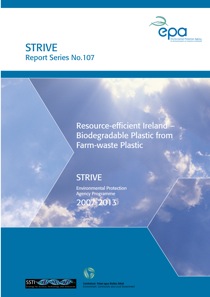
Resource-efficient Ireland – Biodegradable Plastic from Farm-waste Plastic
Year: 2013
This project looks at upcycling waste plastic from Irish farms to a more valuable biodegradable form of plastic.
[1].jpg)
SIMBIOSYS: Sectoral Impacts on Biodiversity and Ecosystem Services
Year: 2013
The SIMBIOSYS Project investigated the impacts that human activity have on biodiversity and ecological functioning, and the associated benefits of biodiversity to human society, that is, ecosystem services.
Water Joint Programming Initiative Pilot Call Pre-Announcement
REVISED Version, September 2013
Year: 2013
This Pilot Call for proposals aims to enable multi-national, collaborative research, development and innovation projects addressing the topic “Emerging water contaminants – anthropogenic pollutants and pathogens”.
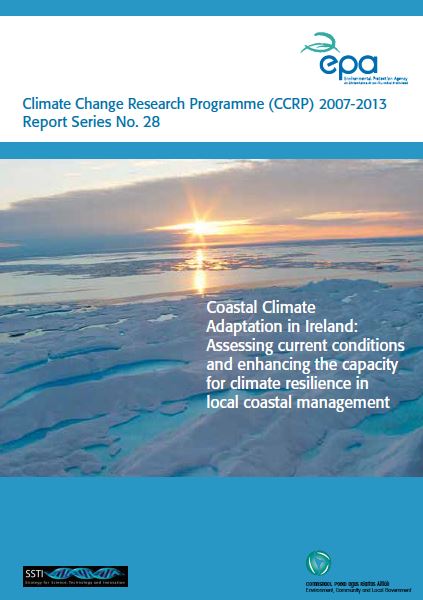
Coastal Climate Adaptation in Ireland
Assessing current conditions and enhancing the capacity for climate resilience in local coastal management. Climate Change Research Report Programme (CCRP) 2007 - 2013 Report Series No. 28, September 2013
Year: 2013
Looks at adaptation options and responses in the Cork area.
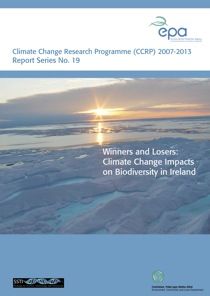
Winners and Losers: Climate Change Impacts on Biodiversity in Ireland
Climate Change Research Programme (CCRP) 2007 - 2013 Report Series No. 19, September 2013
Year: 2013
Research report on climate change impacts on Biodiversity in Ireland, projecting changes and informing adaptation measures
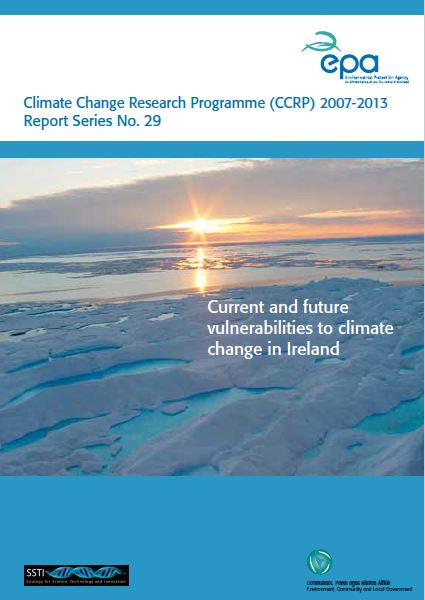
Current and Future Vulnerabilities to Climate Change in Ireland
Climate Change Research Programme (CCRP) 2007 - 2013 Report Series No. 29, September 2013
Year: 2013
Further research is required to identify critical thresholds or adaptation tipping points. The study recommends a fuller climate change risk assessment to better inform adaptation options.
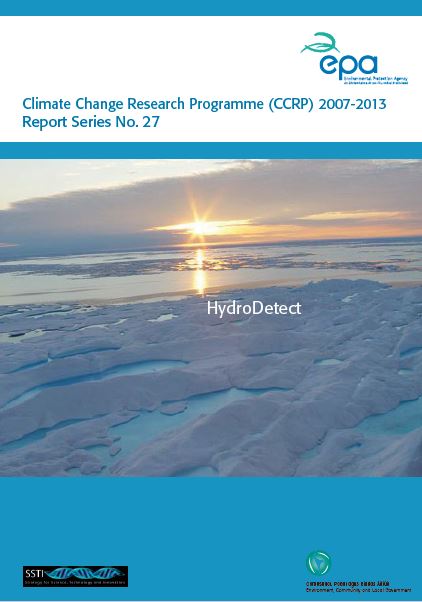
HydroDetect
Climate Change Research Programme (CCRP) 2007 - 2013 Report Series No. 27, September 2013
Year: 2013
The work capitalises on the rich history and strengths of hydrometric monitoring and data collection conducted by the Environmental Protection Agency, the Office of Public Works and Local Authorities. The report provides analysis of signals of climate change in these data.
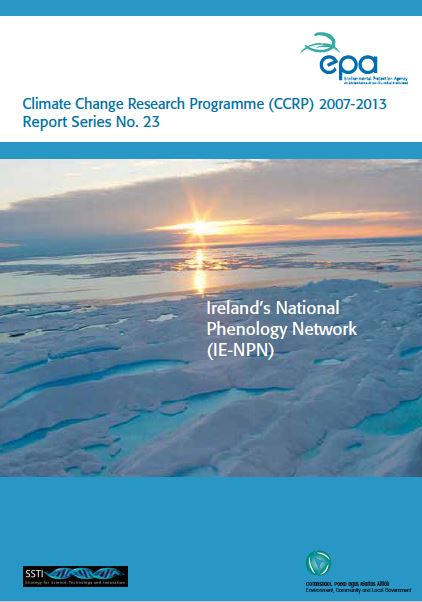
Ireland's National Phenology Network (IE-NPN)
Climate Change Research Programme (CCRP) 2007 - 2013 Report Series No. 23, September 2013
Year: 2013
The study links increasing air temperature, particularly in Spring, to the earlier emergence of leaves which contributes to a longer growing season. However, trends in autumn, towards later leaf fall for example, were much less obvious possibly as day-length is a stronger environmental cue than temperature.
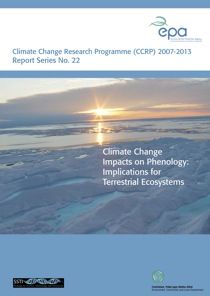
Climate Change Impacts on Phenology: Implications for Terrestrial Ecosystems
Climate Change Research Programme (CCRP) 2007 - 2013 Report Series No. 22, September 2013
Year: 2013
The study links increasing air temperature, particularly in Spring, to the earlier emergence of leaves which contributes to a longer growing season. However, trends in autumn, towards later leaf fall for example, were much less obvious possibly as day-length is a stronger environmental cue than temperature.
Draft Terms of Reference for a Research Programme on the Environmental Impacts of UGEE
Document for Public Consultation, August 2013
Year: 2013
Draft Terms of Reference for a Research Programme on the Environmental Impacts of UGEE
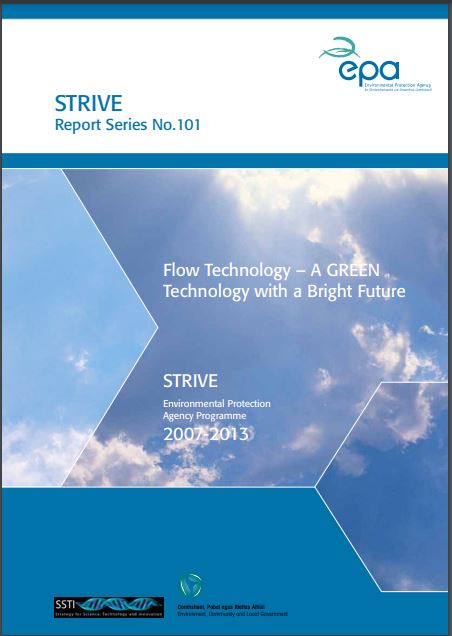
STRIVE 101 - Flow Technology – A green technology with a bright future
STRIVE Report 101: Kieran Nolan, Alexander Yavorskyy, Michael Oelgemöller, Oksana Shvydkiv, July 2013
Year: 2013
Currently, for every 1kg of active pharmaceutical product produced between 25 and 100kg of waste is generated. This project looks at new technologies that reduce water and energy requirements, offering cost savings and improved product yield, with less waste gnerated.

Climate Change Research Programme - Thematic areas and projects funded
Year: 2013
This brochure highlights projects funded under the EPA's Climate Change Research Programme to date.
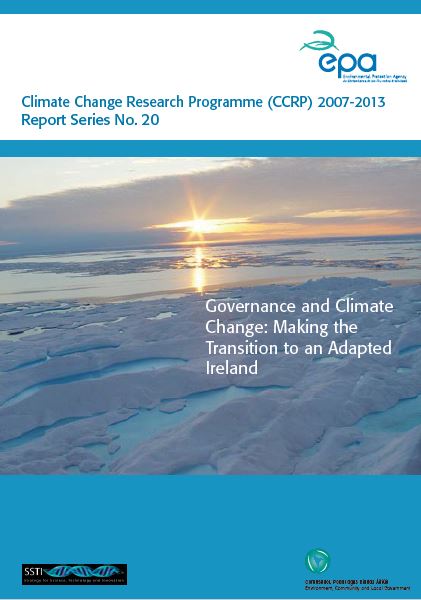
Governance and Climate Change - Making the transition to an adapted Ireland
CCRP 20: McGloughlin, J.S & Sweeney, J, July 2013
Year: 2013
This report presents an initial assessment of local authority climate change adaptation preparations.
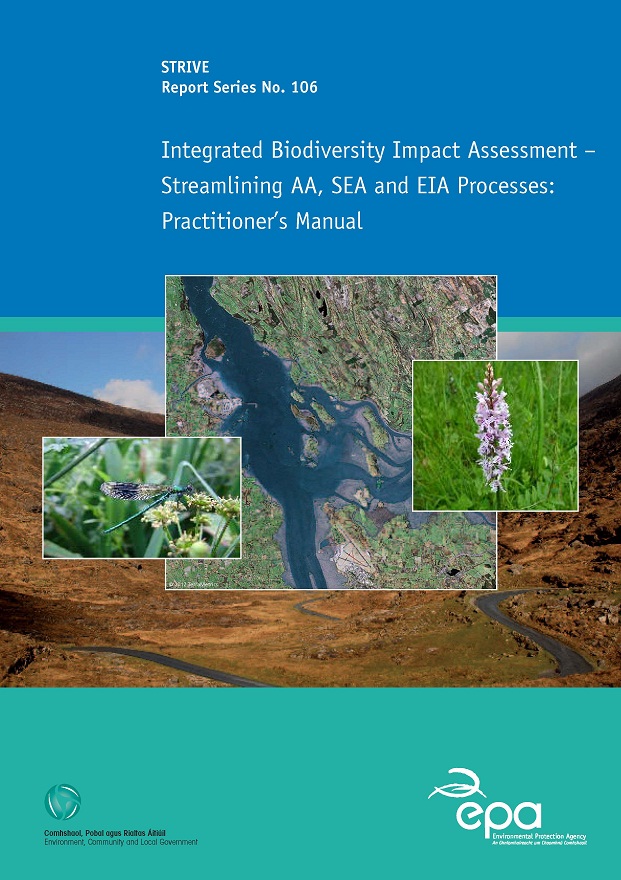
Integrated Biodoversity Impact Assessment - Streamlining AA, SEA and EIA Processes - Practicioner's Manual
Year: 2013
This practitioner’s manual provides step-by-step guidance on integrating processes for biodiversity impact assessment.
Water saving technologies to reduce water consumption and wastewater production
Year: 2013
Dr Donata Dubber and Dr Laurence Gill - Water saving technologies to reduce water consumption and wastewater production in Irish households
Summary of Findings - Towards a Green Net National Product for Ireland
Year: 2013
Summary of Findings - STRIVE Report 103
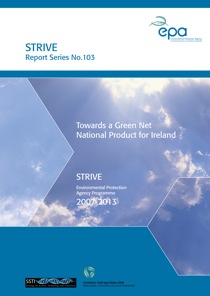
Ecosystem Indicators for the Marine Strategy Framework Directive (MSFD)
MSFD-Support Research on OSPAR Ecological Quality Objectives, May 2013
Year: 2013
STRIVE Report 105 - Samuel Shephard, David G. Reid, Deirdre Brophy, Rick Officer and Ian O’Connor
Summary of Findings - Ecosystem indicators for the Marine Strategy Framework Directive (MSFD)
Authors: Samuel Shephard, Deirdre Brophy, Rick Officer, Ian O’Connor & David Reid, May 2013
Year: 2013
Summary of Findings - STRIVE Report 105